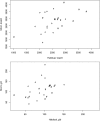Short sleep duration increases energy intakes but does not change energy expenditure in normal-weight individuals
- PMID: 21715510
- PMCID: PMC3142720
- DOI: 10.3945/ajcn.111.013904
Short sleep duration increases energy intakes but does not change energy expenditure in normal-weight individuals
Abstract
Background: Evidence suggests a relation between short sleep duration and obesity.
Objective: We assessed energy balance during periods of short and habitual sleep in normal-weight men and women.
Design: Fifteen men and 15 women aged 30-49 y with a body mass index (in kg/m(2)) of 22-26, who regularly slept 7-9 h/night, were recruited to participate in this crossover inpatient study. All participants were studied under short (4 h/night) and habitual (9 h/night) sleep conditions, in random order, for 5 nights each. Food intake was measured on day 5, and energy expenditure was measured with the doubly labeled water method over each period.
Results: Participants consumed more energy on day 5 during short sleep (2813.6 ± 593.0 kcal) than during habitual sleep (2517.7 ± 593.0 kcal; P = 0.023). This effect was mostly due to increased consumption of fat (20.7 ± 37.4 g; P = 0.01), notably saturated fat (8.7 ± 20.4 g; P = 0.038), during short sleep. Resting metabolic rate (short sleep: 1455.4 ± 129.0 kcal/d; habitual sleep: 1486.5 ± 129.5 kcal/d; P = 0.136) and total energy expenditure (short sleep: 2589.2 ± 526.5 kcal/d; habitual sleep: 2611.1 ± 529.0 kcal/d; P = 0.832) did not differ significantly between sleep phases.
Conclusions: Our data show that a reduction in sleep increases energy and fat intakes, which may explain the associations observed between sleep and obesity. If sustained, as observed, and not compensated by increased energy expenditure, the dietary intakes of individuals undergoing short sleep predispose to obesity. This trial is registered at clinicaltrials.gov as NCT00935402.
Figures
Comment in
-
Compromised sleep increases food intake in humans: two sexes, same response?Am J Clin Nutr. 2012 Feb;95(2):531; author reply 531-2. doi: 10.3945/ajcn.111.028647. Am J Clin Nutr. 2012. PMID: 22268023 No abstract available.
Similar articles
-
Short sleep duration is associated with higher energy intake and expenditure among African-American and non-Hispanic white adults.J Nutr. 2014 Apr;144(4):461-6. doi: 10.3945/jn.113.186890. Epub 2014 Feb 12. J Nutr. 2014. PMID: 24523490 Free PMC article.
-
Effect of Sleep Extension on Objectively Assessed Energy Intake Among Adults With Overweight in Real-life Settings: A Randomized Clinical Trial.JAMA Intern Med. 2022 Apr 1;182(4):365-374. doi: 10.1001/jamainternmed.2021.8098. JAMA Intern Med. 2022. PMID: 35129580 Free PMC article. Clinical Trial.
-
Postprandial thermogenesis and substrate oxidation are unaffected by sleep restriction.Int J Obes (Lond). 2014 Sep;38(9):1153-8. doi: 10.1038/ijo.2013.239. Epub 2013 Dec 19. Int J Obes (Lond). 2014. PMID: 24352294 Free PMC article. Clinical Trial.
-
Experimental sleep curtailment causes wake-dependent increases in 24-h energy expenditure as measured by whole-room indirect calorimetry.Am J Clin Nutr. 2013 Dec;98(6):1433-9. doi: 10.3945/ajcn.113.069427. Epub 2013 Oct 2. Am J Clin Nutr. 2013. PMID: 24088722 Free PMC article. Clinical Trial.
-
The role of sleep duration in the regulation of energy balance: effects on energy intakes and expenditure.J Clin Sleep Med. 2013 Jan 15;9(1):73-80. doi: 10.5664/jcsm.2348. J Clin Sleep Med. 2013. PMID: 23319909 Free PMC article. Review.
Cited by
-
The Relationship Between Anthropometric Indices of Obesity and Sleep Disturbances in Young Adults.Cureus. 2024 Oct 9;16(10):e71178. doi: 10.7759/cureus.71178. eCollection 2024 Oct. Cureus. 2024. PMID: 39525192 Free PMC article.
-
Time-Restricted Eating Versus Daily Calorie Restriction: Effect on Sleep in Adults with Obesity over 12 Months.Nutrients. 2024 Oct 18;16(20):3528. doi: 10.3390/nu16203528. Nutrients. 2024. PMID: 39458522 Free PMC article. Clinical Trial.
-
Energy Deficit is a Key Driver of Sleep Homeostasis.bioRxiv [Preprint]. 2024 Jun 27:2024.05.30.596666. doi: 10.1101/2024.05.30.596666. bioRxiv. 2024. PMID: 38979352 Free PMC article. Preprint.
-
Diet induced thermogenesis, older and newer data with emphasis on obesity and diabetes mellitus - A narrative review.Metabol Open. 2024 Jun 5;22:100291. doi: 10.1016/j.metop.2024.100291. eCollection 2024 Jun. Metabol Open. 2024. PMID: 38957623 Free PMC article. Review.
-
Short Sleep Duration Disrupts Glucose Metabolism: Can Exercise Turn Back the Clock?Exerc Sport Sci Rev. 2024 Jul 1;52(3):77-86. doi: 10.1249/JES.0000000000000339. Epub 2024 Apr 12. Exerc Sport Sci Rev. 2024. PMID: 38608214 Review.
References
-
- Chen X, Beydoun MA, Wang Y. Is sleep duration associated with childhood obesity? A systematic review and meta-analysis. Obesity (Silver Spring) 2008;16:265–74 - PubMed
-
- Spiegel K, Tasali E, Penev P, Van Cauter E. Brief communication: sleep curtailment in healthy young men is associated with decreased leptin levels, elevated ghrelin levels, and increased hunger and appetite. Ann Intern Med 2004;141:846–50 - PubMed
-
- Spiegel K, Leproult R, L'Hermite-Baleriaux M, Copinschi G, Penev PD, Van Cauter E. Leptin levels are dependent on sleep duration: relationships with sympathovagal balance, carbohydrate regulation, cortisol, and thyrotropin. J Clin Endocrinol Metab 2004;89:5762–71 - PubMed
Publication types
MeSH terms
Associated data
Grants and funding
LinkOut - more resources
Full Text Sources
Other Literature Sources




